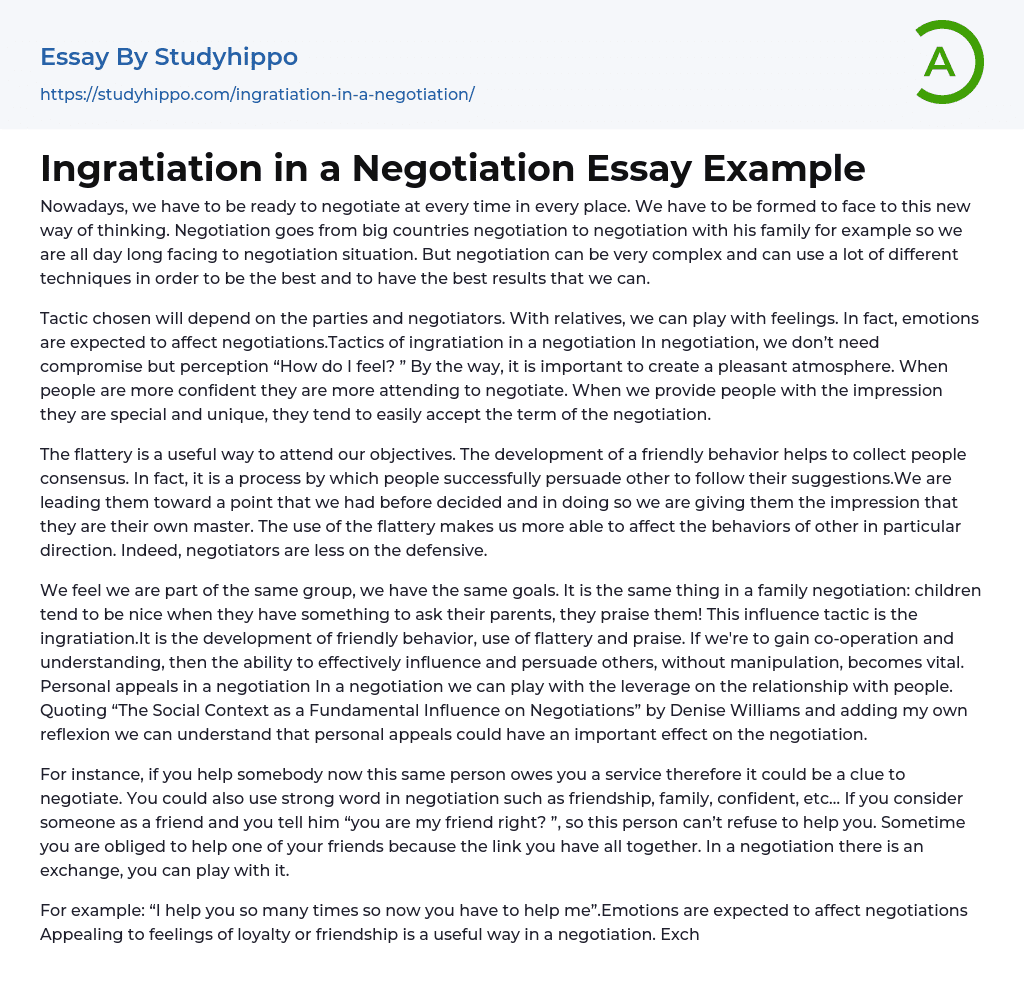Nowadays, we have to be ready to negotiate at every time in every place. We have to be formed to face to this new way of thinking. Negotiation goes from big countries negotiation to negotiation with his family for example so we are all day long facing to negotiation situation. But negotiation can be very complex and can use a lot of different techniques in order to be the best and to have the best results that we can.
Tactic chosen will depend on the parties and negotiators. With relatives, we can play with feelings. In fact, emotions are expected to affect negotiations.Tactics of ingratiation in a negotiation In negotiation, we don’t need compromise but perception “How do I feel? ” By the way, it is important to create a pleasant atmosphere. When people are more con
...fident they are more attending to negotiate. When we provide people with the impression they are special and unique, they tend to easily accept the term of the negotiation.
The flattery is a useful way to attend our objectives. The development of a friendly behavior helps to collect people consensus. In fact, it is a process by which people successfully persuade other to follow their suggestions.We are leading them toward a point that we had before decided and in doing so we are giving them the impression that they are their own master. The use of the flattery makes us more able to affect the behaviors of other in particular direction. Indeed, negotiators are less on the defensive.
We feel we are part of the same group, we have the same goals. It is the same thing in a
family negotiation: children tend to be nice when they have something to ask their parents, they praise them! This influence tactic is the ingratiation.It is the development of friendly behavior, use of flattery and praise. If we're to gain co-operation and understanding, then the ability to effectively influence and persuade others, without manipulation, becomes vital. Personal appeals in a negotiation In a negotiation we can play with the leverage on the relationship with people. Quoting “The Social Context as a Fundamental Influence on Negotiations” by Denise Williams and adding my own reflexion we can understand that personal appeals could have an important effect on the negotiation.
For instance, if you help somebody now this same person owes you a service therefore it could be a clue to negotiate. You could also use strong word in negotiation such as friendship, family, confident, etc… If you consider someone as a friend and you tell him “you are my friend right? ”, so this person can’t refuse to help you. Sometime you are obliged to help one of your friends because the link you have all together. In a negotiation there is an exchange, you can play with it.
For example: “I help you so many times so now you have to help me”.Emotions are expected to affect negotiations Appealing to feelings of loyalty or friendship is a useful way in a negotiation. Exchange in a negotiation According to the theory “Exchange And Reciprocity In International Negotiations” explain by Deborah Welch Larson, the notion of exchange is essential in a negotiation. Exchange is often motivated by the prospect of mutual gain and the offer or the promise of benefits
in change of desired behavior is a good way to conclude.
There is 3 different ways to speak about exchange: exchanging favors, sharing benefits, establishing reciprocity. It is possible to make arrangements, if someone accepts what you except this time you can give you your words to accept his terms next time. Indeed, exchanging favors that is to say “If you do so, I will do so”, it is also a good implementation of the negotiation rules. -In a deal it is sometimes useful to explain to the counterpart what will be his added value if he concludes the contract.
Indeed, showing first his interest and demonstrate clearly his gain and the benefits that he could in a near future obtains it is a quite good argument. We can establish reciprocity in the negotiation. Thus, it is an arrangement between two participants. Reciprocity refers to exchanges which are mutual and perceived by the parties as fairFor instance: a company providing services to a trade journal may pay for advertising space in the journal with their services. A reciprocity opportunity may persuade a company to choose a less desirable vendor in exchange for sales made to that vendor.
Another example will be: “I agree to discount my sell price from 20% if in returns you accept to keep the brand name”.
- Arranged Marriage essays
- Communication essays
- Conflict Management essays
- Conflict Resolution essays
- Connection essays
- Conversation essays
- Dating essays
- Friendship essays
- Mediation essays
- Business Analysis essays
- Business Plan essays
- Community Development essays
- Competition essays
- Effective Leadership essays
- Leadership Styles essays
- Mission Statement essays
- Negotiation essays
- Outsourcing essays
- Planning essays
- Public relations essays
- Reasoning essays
- Strategic Management essays
- Strategic Planning essays
- Swot Analysis essays
- Abnormal Psychology essays
- Abraham Maslow essays
- Attachment Theory essays
- Authority essays
- Behaviorism essays
- Classical Conditioning essays
- Cognitive Psychology essays
- Counseling essays
- Developmental Psychology essays
- Educational Psychology essays
- Erik Erikson essays
- Family Therapy essays
- Jean Piaget essays
- Maslow's Hierarchy Of Needs essays
- Mental Health essays
- Operant Conditioning essays
- Personality Psychology essays
- Positive Psychology essays
- Psychoanalysis essays
- Psychotherapy essays
- Sigmund Freud essays
- Social Psychology essays
- Stanford Prison Experiment essays
- Supersize Me essays




